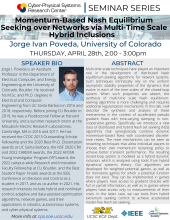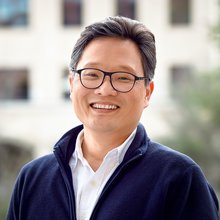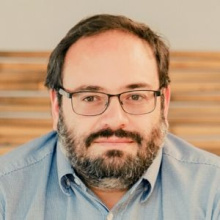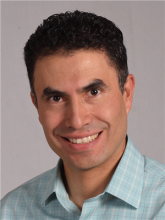CPS Events
Momentum-Based Nash Equilibrium Seeking over Networks via Multi-Time Scale Hybrid Inclusions
Abstract
Multi-time scale techniques have played an important role in the development of distributed Nash equilibrium-seeking algorithms for network systems. Such techniques intrinsically rely on the uniform asymptotic stability properties of the dynamics that evolve in each of the time scales of the closed-loop system. When such properties are absent, the synthesis of multi-time scale Nash equilibrium-seeking algorithms is more challenging and requires additional regularization mechanisms. In this talk, I will describe the synthesis and analysis of these mechanisms in the context of accelerated pseudo gradient flows with time-varying damping in non-cooperative games. Specifically, we introduce a new class of distributed and hybrid Nash set seeking (NSS) algorithms that synergistically combine dynamic momentum-based flows with coordinated discrete-time resets. The reset mechanisms can be seen as restarting techniques that allow individual players to choose their own momentum restarting policy to achieve better transient performance. The resulting closed-loop system is modeled as a hybrid dynamic inclusion, which is analyzed using tools from hybrid dynamical system's theory. Our algorithms are developed for weighted potential games, as well as for monotone games for which a potential function does not exist. They can be implemented in games where players have access to gradient Oracles with full or partial information, as well as in games where players have access only to measurements of their costs. In the latter case, we use tools from hybrid extremum seeking control to achieve accelerated model-free Nash set seeking.
Bio
Jorge I. Poveda is an Assistant Professor in the Department of Electrical, Computer, and Energy Engineering at the University of Colorado, Boulder. He received his M.Sc. and Ph.D. degrees in Electrical and Computer Engineering from UC Santa Barbara in 2016 and 2018, respectively. Before joining CU Boulder in 2019, he was a Postdoctoral Fellow at Harvard University, and a summer research intern at the Mitsubishi Electric Research Laboratories, Cambridge, MA in 2016 and 2017. He has received the CCDC 2013 Outstanding Scholar Fellowship and the 2020 Best Ph.D. Dissertation awards at UC Santa Barbara, the NSF 2020 CRII and 2022 CAREER awards, the 2022 AFOSR Young Investigator Program (YIP) award, the 2022 campus-wide Research and Innovation Faculty Fellowship at CU Boulder, and the Best Student Paper Finalist awards at the IEEE Conference on Decision and Control as a student in 2017, and as co-author in 2021. His research interests include hybrid and nonlinear control, adaptive and data-assisted optimization algorithms, network games, and their applications in robotics, autonomous systems, and cyber-physical systems.
Real-time Biosensors: Continuous measurements of biomolecules in live subjects
Abstract
A biosensor capable of continuously measuring specific molecules in vivo would provide a valuable window into patients’ health status and their response to therapeutics. Unfortunately, continuous, real-time molecular measurement is currently limited to a handful of analytes (i.e. glucose and oxygen) and these sensors cannot be generalized to measure other analytes. In this talk, we will present a biosensor technology that can be generalized to measure a wide range of biomolecules in living subjects. To achieve this, we develop synthetic antibodies (aptamers) that change its structure upon binding to its target analyte and produce an electrochemical current or emit light. Our real-time biosensor requires no exogenous reagents and can be readily reconfigured to measure different target analytes by exchanging the aptamer probes in a modular manner. Using our real-time biosensor, we demonstrate the first closed loop feedback control of drug concentration in live animals and discuss potential applications of this technology. Finally, we will discuss methods for generating the aptamer probes which are at the heart of this biosensor technology.
Bio
Dr. H. Tom Soh is a Professor of Electrical Engineering and Radiology at Stanford University. He earned his B.S. with a double major in Mechanical Engineering and Materials Science with Distinction from Cornell University and Ph.D. in Electrical Engineering from Stanford University. Between 1999 and 2003, he served as a technical manager of MEMS device research group at Bell Laboratories and Agere Systems. Between 2003 and 2015, he was the Ruth Garland Professor at UC-Santa Barbara (UCSB) in the department of Mechanical Engineering and Materials. His lab moved to Stanford in 2015. He is a recipient of numerous awards including MIT Technology Review’s “TR 100” Award, ONR Young Investigator Award, Beckman Young Investigator Award, ALA Innovator Award, NIH TR01 Award, NIH Edward Nagy Award, Guggenheim Fellowship, Humboldt Fellowship, and was a Chan-Zuckerberg Biohub Investigator. He is a fellow of the American Institute for Medical and Biological Engineering (AIMBE) and member of the National Academy of Inventors (NAI).
Introduction to Alternative Position, Navigation and Timing (A-PNT)
Abstract
Global Navigation Satellite Systems (GNSS) such as the United States’ Global Positioning System (GPS), Russia’s Global Navigation Satellite System (GLONASS), China’s BeiDou Navigation Satellite System (BDS) and the European Union’s Galileo were initially deployed for defense navigation but have become essential to everyday life. The range of application of satellite- derived navigation spans numerous market segments such as science, transport, agriculture, safety and of ever-increasing importance, autonomous vehicle navigation.
As useful as these sources of navigation are to everyday life, these systems are surprisingly vulnerable to signal degradation, elimination, jamming and spoofing. Over the past decade the United States government has become increasingly aware of the vulnerabilities of GNSS and is investing tens of millions of dollars in public and private research to find Alternative Position, Navigation and Timing (A-PNT) solutions to augment GNSS.
This introductory seminar will outline GNSS vulnerabilities and their impact, and outline some of the prevailing A-PNT approaches. Core to many of the A-PNT solutions is multilateration (MLAT) and hyperbolic positioning techniques. These techniques will be introduced with examples. Factors that impact the accuracy of MLAT techniques, such as Geometric Dilution Of Precision (GDP), time synchronization and noise will be outlined. One of the up-and-coming promising A-PNT techniques, “Signals Of Opportunity (SOOP)” will be introduced with example terrestrial and LEOS satellite use cases.
Bio
Serial entrepreneur Dr. Charles Barry has devoted 40 years to develop and deliver IP networking and synchronization products that have elevated the performance of top global service providers, financial trading networks, and more.
Dr. Barry, continues to put his singular vision into play as founder and CEO of Luminous Cyber Corp. Luminous Cyber applies data science to improving network performance, security, and geospatial intelligence. Most recently, Luminous Cyber Corp received SBIR funding from US Department of Energy and US Air Force for advanced network research in network analytics, synchronization and Alternative Position, Navigation and Timing (A-PNT).
Previously, Dr Barry played key roles at Jolata, Brilliant Telecommunications (acquired by Juniper Networks NASDAQ: JNPR), and Luminous Networks (acquired by Adtran NASDAQ: ADTN), among others.
Dr. Barry holds a Ph.D. and a MSEE from Stanford, a B.S. in Physics from MIT and has co-authored more than a dozen patents.
Von Neumann Meets the Nexus Problem
Abstract
Recently, there has been in the control community an increasing interest in studying large- scale distributed systems (LSDS). One of this LSDS is what the World Economic Forum defined in 2008 as the nexus problem, which arises in today’s major cities. In order to address the energy-water-food-transportation nexus, which includes different cyber- physical systems, networks, and management areas, a systemic approach could be useful. One way to approach this type of problems is to use game-theoretical methods. Game theory shares some common points with control systems problems, in particular of distributed topology, where the interconnection of different elements (agents) leads to a global behavior depending on the local interaction of these agents. The aim of this talk is to present and discuss how the nexus problem has been modeled in a microcity, and how the energy-transportation nexus could be address from a population games and evolutionary dynamics perspective.
Bio
Nicanor Quijano (IEEE Senior Member) received his B.S. degree in Electronics Engineering from Pontificia Universidad Javeriana (PUJ), Bogotá, Colombia, in 1999. He received the M.S. and PhD degrees in Electrical and Computer Engineering from The Ohio State University, in 2002 and 2006, respectively. In 2007, he joined the Electrical and Electronics Engineering Department, Universidad de los Andes (UAndes), Bogotá, Colombia as an Assistant Professor. He is currently a Full Professor, the director of the research group in control and automation systems (GIAP, UAndes), and an associate editor for the IEEE Transactions on Control Systems Technology, the Journal of Modern Power Systems and Clean Energy, and Energy Systems. He has been a member of the Board of Governors of the IEEE Control Systems Society (CSS) for the 2014 period, and he was the chair of the IEEE CSS, Colombia for the 2011-2013 period. He has published more than 100 scientific papers (journal papers, international conference papers, book chapters), he has co- advised the best European PhD thesis in the control systems area in 2017, and he is the co-author of the best paper of the ISA Transactions, 2018. In 2021, he obtained the Experienced Research Award from the School of Engineering, UAndes. Currently his research interests include hierarchical and distributed network optimization methods for control using learning, bio-inspired, and game-theoretical techniques for dynamic resource allocation problems, especially those in energy, water, agriculture, and transportation.
Robotics Motion Planning and Learning
Abstract
A very successful approach for finding the motions for a robot to move from some initial configuration to a goal configuration is sampling-based motion planning. In this approach, the planner performs a systematic exploration, through sampling, of the configuraton space in order to build a connectivity map that the robot can follow. These planners trade completeness for probabilistic completeness, which means that given enough time, they will find existing paths with high probability, although they are not able to tell when there is no such path. In this talk, I will discuss how, while exploring the configuration space, sampling based planners are also able to extract features that can be useful to produce better maps. I will also briefly talk about my work on multi-agent planning and autonomous navigation.
Bio
Marco Morales Aguirre is a Teaching Associate Professor at the Department of Computer Science at the University of Illinois Urbana-Champaign and he is currently on leave as an Associate Professor at the Department of Computer Science at Instituto Tecnológico Autónomo de México (ITAM). He has also been a Visiting Professor at Texas A&M University and a Lecturer at Universidad Nacional Autónoma de México (UNAM). He holds a Ph.D. in Computer Science from Texas A&M University, a M.S. in Electrical Engineering and a B.S. in Computer Engineering from UNAM. His main research interests are in motion planning and control for autonomous robots, artificial intelligence, machine learning, and computational geometry.






